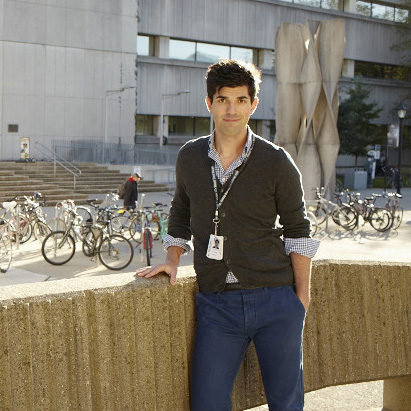Sean McCurdy

Sean McCurdy
Alumnus, PhD (2016), Laboratory Medicine & Pathobiology
“It's the people that are remarkable. That's what makes U of T my home.”
In high school, I had a keen interest in mechanical engineering; my dream was to build robots that could cure cancer.
By chance, I heard about U of T’s Da Vinci Engineering Enrichment Program (DEEP), an international pre-university outreach program for high school students. I took classes ranging from black hole thermodynamics to biomaterial and biomedical engineering. The classes inspired me to take unconventional approaches to problem solving. While I felt disconnected from engineering, the passion and guidance of my instructors showed me a world of opportunity. I wanted to change the world and I needed a place to do it.
That experience brought me to the University of Toronto at Scarborough (UTSC). Within the first few months, my academic curiosity propelled me into medical science research in Parkinson’s disease, diabetes, pathology, and cardiology. Overall, my University experience helped me to explore different parts of my personality and find a way to positively impact the community around me.
The basic idea of my PhD is to figure out how to stop cancer before it appears. We know quite a bit about tumor biology because when tumors form, we can remove and examine them. However, we have limited knowledge of what starts cancer because we don’t know it’s there until clinical symptoms appear. In fact, there’s only a few cancers in which the initiation events are known, one of which is a rare pediatric cancer called retinoblastoma (RB). Several years ago, we found two factors which drive retinoblastoma initiation. We then acquired targeted drugs to block activity of either of these factors. Since RB and RB pathway aberrations are found in virtually every tumor, it may be possible to prevent other kinds of tumors from forming using this strategy.
In the last year of my undergraduate degree, I had applied to a few different programs across Canada. I wanted to find opportunities, flexibility, and resources to build on the foundation established at UTSC. While many of the other programs in Canada seemed very promising, I ultimately wanted a place to incubate and develop ideas. Toronto had everything: innovation centres, academic hospitals, business affiliations, a massive library network, diversity of faculty, a connection to UTSC, and my awesome friends.
During the course of my PhD at the Department of Laboratory Medicine and Pathobiology, I have had the privilege to meet literally hundreds of world-class experts. My mentors have played a crucial role in my development as a scientist and as a person. So I’m always grateful to have these people in my life. The staff at U of T are understanding and are strong advocates for students. At the end of the day, it’s the people that are remarkable. That’s what makes U of T my home.
I’m driven by opportunity to positively impact my community. Throughout my time at U of T, I had a chance to explore several different career paths including research, business, health care, music performer, event planning, teaching, non-profit sector, and even talk show host! From these experiences, I found that I deeply care about people’s well-being. Sometimes, that could mean giving advice, solving a problem together, or just providing a space for individuals to be heard and acknowledged. On the other hand, I also love to listen to new ideas, be inspired, create and share my own, and find clever ways to put them into practice. While I’m not sure what about the future holds for me, I feel confident about my preparation, ingenuity, and direction.
